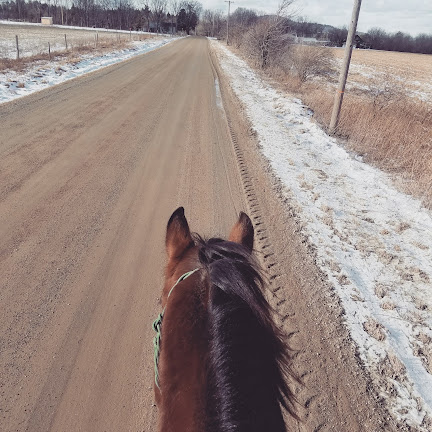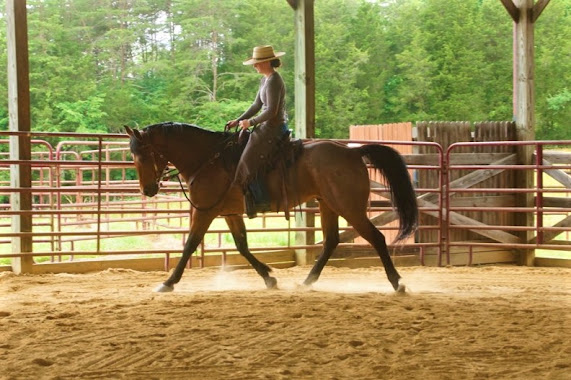"Toughness": When It Helps, When It Hurts
I participate in a couple of online horse forums: I enjoy the range of experience and even though I am on a pretty particular path when it comes to horsemanship it's always interesting to see the range of belief systems and training paradigms. There was recently a thread started asking posters their thoughts around a fairly common belief system in the horse world, the "tough equestrian". As this poster so eloquently put it, her belief was in the mentality of "get on or go home" and, in the event of a fall, "get back on or head to the hospital". This poster felt our society was filled with weak individuals who had no mental toughness or grit and that this was - in their mind - a character flaw.
In my initial response point out that while I didn't disagree about the importance of grit and mental toughness (and even agreed that many people struggle to develop it) her belief system lacked a critical component: empathy. She asked me to elaborate on my points, specifically the ones that were in line with her beliefs. Here is my response:
"The mentality you express is that there is only one way to Rome and that path is rocky, pitted, lined with broken wagon wheels and monster craters and the remains of those who have tried and failed. The way you have expressed it, if you can’t make it down that path come hell or high water, or refuse to even attempt it, you are showing mental weakness and you have clearly stated this is character fault in your mind.
Experience has taught me that one of the underlying reasons so many have a hard time developing true mental toughness is because of this very idea that there is only one way to Rome. Grit is something you develop with experience, specifically experience trying and failing, rinse and repeat, over and over while managing to carry on trying. It takes time. It takes practice. Honestly, it often takes some guidance, too, from someone who has been there and lived through it and come out the other side and can offer encouragement when you’re struggling. And during all that time spent practicing, you develop empathy for those who haven’t made it as far as you have because you now understand what it’s like to struggle.
At some point you very well might be able to take that rough road to Rome and come out in one piece, but recognizing your limitations from the outset or noticing another path and deciding to try that is hardly a sign of weakness.
I am a horsemanship instructor. I teach a similar style and with a similar way of thinking about horses as folks like the Dorrances, Ray Hunt, Harry Whitney, et al. The vast majority of my students are amateur riders who love their horses and want to get better but don’t always have all the tools they need to figure it out on their own and, ironically, have been intimidated and discouraged by this idea that they must persist at all costs, all the time, or else they are weak-willed and destined to be unsuccessful. What kind of teacher would I be if I demanded that from them? What kind of human would I be? How much assistance would I really be to them in the long term? Am I really helping them get closer to the goal of developing some toughness, some grit, if I don’t meet them where they are at so I can help them cultivate it for themselves?
I have found - more often than not - that this hardline type of thinking belongs to those who carry quite a bit of emotional baggage. It’s a coping mechanism, a shield, a way to protect oneself because those vulnerabilities just below the surface are far too painful to work through. I see it all the time with riders. I’ve dealt with it within myself. It’s far, far easier to judge others than to turn inward. In my experience, those with true confidence don’t need to turn all that much attention to the practice of judging others because it serves no greater purpose for them. And as a general practice? It’s pretty darn hard to divorce this type of expectation of oneself from one’s horse, and for that reason I feel is has absolutely no place in horsemanship."
This person reports to be of similar age to me but I find their belief system and responses within the conversation to reflect someone who lacks the maturity to recognize that hard-lining in any direction is a big ol' red flag for insecurity. How do I know? I used to be a card-carrying member of that club: if you didn't do it the way I did I didn't have any respect or need for you.
I've grown up wee bit since then and while I am still practicing reserving my judgment and allowing others to play their lives out how as they wish, I am far more open to the many, many roads to Rome than I used to be. It's occurred to me the many wonderful teachers I've had over the years probably had to do the same thing I find myself doing now: bite their tongues, have faith and think "she'll get there in her own time." Let me tell you...that's a pretty humbling epiphany.
True mental toughness is not the single-minded willingness to throw on a set of blinders and soldier on at all costs. True mental toughness is having developed the wisdom to "know when to hold 'em, know when to fold 'em" and walk away from having folded with humility and grace.


Comments
Post a Comment